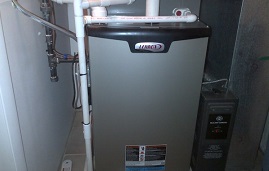Fall is a great time to take a look at your heater and evaluate any problems that it may be experiencing. If the temperature outside is cooler, it’s likely that you’re already using your heater on a daily basis. This will change as we get closer to colder winter weather months and the demands on your heater will need to increase to meet your home comfort needs. Here are four signs of problems with your heater that you will want to correct before the colder months arrive.
Can You Diagnose Heater Problems?
A problem with a heating system could be caused by a wide variety of different issues. A heater is a complex piece of equipment, and a correctly identifying the specific problem is difficult. A professional licensed heating engineer needs formal training to spot a problem and have the skills to fix it. Of course, it’s easy to notice something unusual, such as strange noises, a loss of heating performance or a sudden shutdown, but an expert knowledge is required to identify the problem.
1. The Heat Levels are Insufficient:
The indoor air may feel warm, but turning the heater up has little effect, and the air just cannot get as warm as you need. When your heater cannot generate sufficient heat levels, it could be caused by a few different problems. A component could be malfunctioning and causing the system to operate intermittently. A burner could have become clogged with dirt or even rust, and they will need to be cleaned. If there is a leak somewhere in your ductwork the treated air may be escaping and the heating performance will suffer.
2. A Lack of Sufficient Air Flow:
We need airflow to deliver the treated air throughout the home and provide heat. If the air flow levels have decreased or even stopped the source of the problem is usually one of the following. Firstly, it could be the blower that’s beginning to fail or has stopped working altogether. Secondly, there could be a blockage in your ductwork that is impeding the flow of air. A heating engineer will be able to fix or repair the blower and clear any ductwork obstructions quickly.
3. The Heater Shuts Down Suddenly:
It may seem strange, but this is actually a good thing. The heater is designed to shut down as a safety feature to protect sensitive components from being damaged. This usually occurs shortly after the heater is turned on and before the home can be heated. The heater will have to be inspected, and the source of the problem will need to be repaired.
4. A Sudden Energy Bill Increase:
Most people know what their energy bills should look like at different times of the year. If your energy bill increases more than expected at the beginning of the heating season, it could be a sign that there is a problem with your heater. When components begin to fail it often affects the energy efficiency and performance of your heating system. This needs to be fixed quickly to restore performance and bring you energy bill back down to the expected level to save money.
